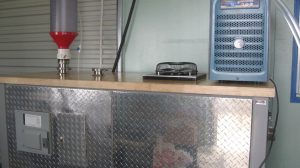
A proof-of-concept unit by EFT.
A new technology makes it possible for a ship to scoop up ocean plastics, convert them to diesel and use the fuel to power the ship on the same voyage.
EcoFuel technologies’ (EFT) portable plastics-to-fuel technology can create about a gallon of diesel from 10 pounds of plastic.
Optimum feedstocks are polyethylene, polypropylene and polystyrene. The process will accommodate other plastics at reduced yields, although some may trigger the need for control or neutralization of by-products, according to Jim Berry and Dave Hinton of JD Energy Consultants, which is working as business development and environmental consulting for EFT.
“These self-contained units produce almost four times the fuel required for their operation, and aboard a ship, not only eliminate the costs of returning plastic to port, land transportation and landfill fees, but the product diesel fuel will extend a ship’s deployment time and excess fuel will likely be marketable at the nearest port,” Berry and Hinton wrote.
The catalyzed continuous process was developed by Dr. Swaminathan Ramesh, a retired polymer chemist and owner of EFT. Compared to traditional plastics-to-oil processes, the EcoFuel Technologies units operate at lower temperatures while eliminating the need for refining.
The company is currently working on commercializing the technology. The plastics-to-fuel units will be available in capacities of 200 and 1,000 gallons per day with others available by order.
Two proof-of-concept units designed to produce 20 gallons per day are available for observation, examination and sample processing. One is at the EFT Laboratory in Livonia, Mich., and the second is at Cabrillo College, Santa Cruz, Calif.
To receive the latest news and analysis about plastics recycling technologies, sign up now for our free monthly Plastics Recycling Update: Technology Edition e-newsletter.
More stories about processing

